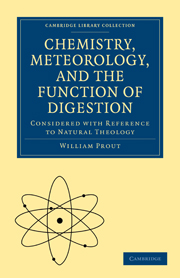Summary
Page 59.—Elementary form of electrical energies, &c. Throughout this work, we have adhered as much as possible to the common language of chemistry. We conceive, however, that the phenomena of chemistry may be expressed in terms of hypotheses, of which the chief are the following:—
1. That every portion of matter attracts, and is attracted by, every other portion of matter, according to laws which have obtained universal assent.
2. That all matter, as it is known to us, exists in the condition of molecules; which molecules we consider to be virtually spheres or spheroids.
3. That all the spherical or spheroidal molecules, when unimpeded, have a tendency to revolve on their axes, with velocities, which in molecules having the same weight, are, under similar circumstances, fixed and definite; but which velocities, according to a law which need not be here specified, increase in molecules of different weights, as the weights of the molecules diminish.
4. That the polarity of molecules results from the motion upon their axes; that fluids exhibit no sensible polarity, because the motions of the contiguous or alternate molecules of which fluids consist are opposite and equal, and thus exactly neutralize each other's effects; that polarity becomes sensible in fluids, when molecules are separated from the neutralizing influence of the contiguous molecules, and move together alone in the same direction; that the opposite motions of contiguous molecules thus separated and moving together alone, are the cause of opposite (positive and negative) polarities; that the intensity of the polarity of molecules is of two kinds, the intensity depending on the greater or less velocity of the molecules, and the intensity depending on the greater or less separation of contiguous molecules; finally, that the quantity of polarity is proportional to the number of molecules moving together alone in the same direction.
Information
- Type
- Chapter
- Information
- Chemistry, Meteorology and the Function of Digestion Considered with Reference to Natural Theology , pp. 559 - 574Publisher: Cambridge University PressPrint publication year: 2009First published in: 1834
